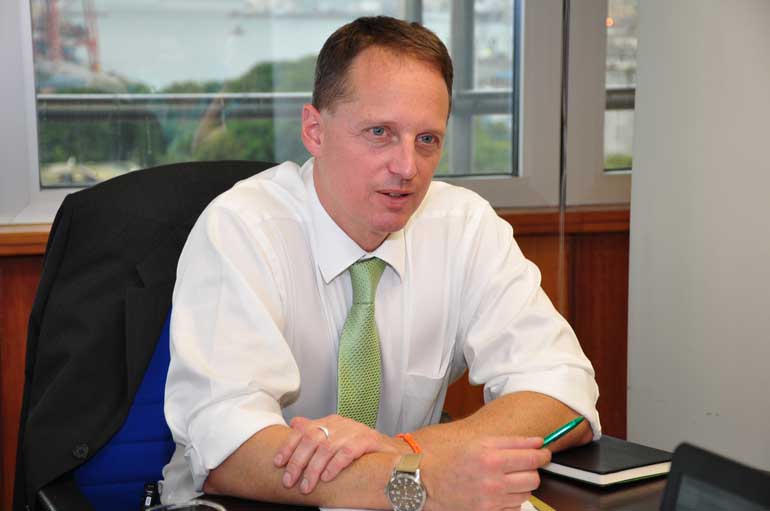Tuesday Feb 17, 2026
Tuesday Feb 17, 2026
Monday, 21 September 2015 00:00 - - {{hitsCtrl.values.hits}}
 IMF Staff Mission Leader Todd Schneider - Pic by Lasantha Kumara
IMF Staff Mission Leader Todd Schneider - Pic by Lasantha Kumara
By Uditha Jayasinghe
As the Government puts together the nuts and bolts of Budget 2016 the International Monetary Fund (IMF) put the onus squarely on increasing revenue to create fiscal room for investment, growth and debt repayment, especially since Sri Lanka is likely to miss its 2015 deficit target.
Winding up a staff mission to Sri Lanka on post-program monitoring, Todd Schneider insisted the new National Government had a good opportunity to evaluate public revenue generation, particularly the tax structure, and find ways to broaden its base and restructure administration.
Revenue is even more important give risks to outlook are tilted to the downside with more volatile external financing conditions resulting from the expected monetary policy tightening in the US and uncertainties over growth prospects in emerging markets, the IMF said.
“Revenue should be the main focus of the next Budget. We are on the same page as the Government authorities that fiscal consolidation is necessary. The debt dynamics are very much in favour of the need for an increase in revenue,” Schneider told journalists at the end of his evaluation visit.
Schneider also rejected claims the Sri Lankan Government had asked for a fresh program of $ 4 billion, pointing out it would be 700% of IMF quota to Sri Lanka. The Government still owes the IMF 200% of its quota for the previous standby agreement.
He pointed out deficit reduction over the past few years came largely from expenditure cuts, in the backdrop of revenue declining as a share of GDP.
“Where Sri Lanka is right now is not a comfortable position. It has one of the lowest tax to GDP ratios in the world. This is why we keep hammering on the issue and it also creates the environment for a growth and investment friendly consolidation,” he added.
“The mission agreed with the authorities on the need to take immediate and credible steps to re-establish fiscal consolidation and reduce public debt. The mission projects a fiscal deficit in the range of 5.5-6%of GDP in 2015—higher than budgeted and financed mainly by domestic borrowing.” Budget 2014 targeted a deficit of 4.4%.
The 2016 budget is an opportunity to shift decisively back to a durable medium-term path of fiscal consolidation and to set macroeconomic priorities for 2016 and beyond, believes the IMF.
The mission strongly recommended keeping the 2016 fiscal deficit to 5.5% of GDP—and to base consolidation on a combination of expenditure restraint and durable revenue reforms. It also emphasised the need to eliminate tax exemptions, tax holidays and reduced rates as the most important component in a strategy to make the tax system simple, fair and efficient.
“The diversity of rates within the system is so varied its almost impenetrable and there are so many exemptions Sri Lanka is effectively relying on the very narrow base and it is not necessarily those who can afford it.”
The IMF noted it would continue engagement with the Government ahead of the Budget.
“The mission welcomes the authorities’ attention to the need for market-based structural reforms and efforts to reinvigorate key initiatives. Fuel and electricity pricing, subsidies, trade policy, liberalisation of factor markets (particularly land) and the investment environment are areas that could play an essential role in sustaining high rates of economic growth.”
The IMF also commended putting state firms on a commercial footing, allowing them to make market-based financial decisions including pricing and subjecting them to the greater financial discipline will also help to reduce risks to the budget and the financial system.